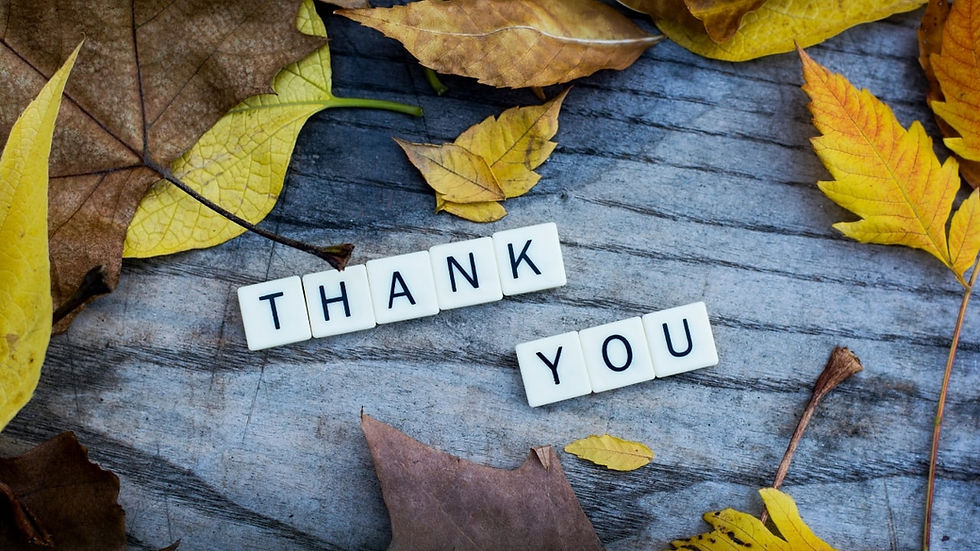Gratitude as a Discipline
- shaecaragher
- Nov 27, 2019
- 3 min read
I LOVE Thanksgiving. It’s my second favorite holiday - after Christmas, of course! I love getting together with family, going over to my cousin’s house, the warmth of the fireplace, Christmas music in the background, the smells wafting through the kitchen to the dining room, piling my plate FULL of mashed potatoes, and just laughing together. It’s such a joyful occasion.

But, obviously with the joy of Thanksgiving, we cannot forget the essence of the holiday: to give thanks and express gratitude.
Each week in my Cairo Orientation class we finish off with Jim, our professor, giving us a spiritual discipline to practice for the week. He’s probably one of the most intellectual and wise people I’ve ever met, so each spiritual discipline topic is followed by an articulate string of encouragement and wisdom. This week’s discipline, to no surprise, is gratitude. Jim explained the importance of gratitude; scientific study after study has found the positive effects of gratitude ranging from decreased anxiety, depression, and negative body image to improvement in school work, professional life, and even healthier interpersonal relationships.
So if gratitude has such overwhelming positive effects, why is it hard for us to do? When we give thanks, we are actually going against our biological hardwiring of “being aware of everything that could go wrong” (aka negativity). Jim gave the great example when millions and millions of years ago, if our ancestors didn’t see a lion they’d be killed. They had to constantly be aware of their surroundings and every possible negative situation. Now, as humans in the modern day, we evidently don’t have to do that, but that is still wired into our mind. Hence the discipline part of gratitude. As a part of a recent project at school, I had to keep a gratitude journal for a week. It was a very eye opening experience, as the things I am grateful for far extended the pages of the journal. I ended up continuing the journal, and I can attest to the results of the scientific studies - intentionally thinking about what you’re grateful for does wonders for your health!
But giving thanks is really, really hard. Sometimes you’ve had a rough day, week, month, or year (queue Friends theme song here) and trying to find something that you’re grateful for in the midst of so much trial and struggle seems like an impossible task. What I came to recognize during this gratitude journal though, is that sometimes expressing gratitude for even the simplest of things is a small spark of encouragement and healing.
Now, I’m not sitting here saying you need to be blindly optimistic in life - NO, don’t do that!!! Trying to be constantly positive is just going to dig you into a deeper hole. I’ve found comfort in this idea of lamenting and praising. In order to give authentic gratitude, it is important to acknowledge the painful things in your life. From pain you can then praise, but the praise should not discount the pain.
For example saying, “This depression right now is incredibly hard but at least I’m living in Santa Barbara” The “but at least” completely discounts the pain of depression. So instead, I try to frame it as, “I’m going through an incredibly hard depression right now. Living in Santa Barbara is a wonderful blessing, but it’s ok that I’m struggling.” Being around people that are constantly negative is exhausting and life-sucking. But being around people that are constantly positive are equally as exhausting and very invalidating. Not saying I’ve mastered the whole balance between the two - definitely not! But validating both the pain and the praise has helped me to appreciate them both.
So during this season of thanks, let’s be aware that there are those that are struggling - you might even be one of them. There are those who lost their families or homes and this season of thanks is an incredibly difficult one. There are those spending their days in the hospital or experiencing the hell of mental health and this time of thanks is a suffocating one. So while thanks is important, so is acknowledging the trials you may be in - it will foster empathy not only for yourself, but also for others; and in turn, it will turn the discipline of gratitude into a more natural and authentic practice.





Комментарии